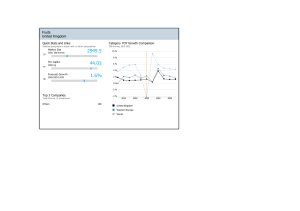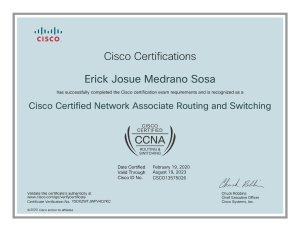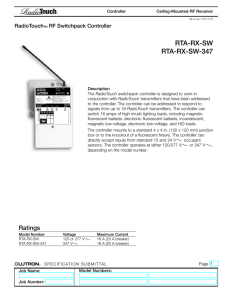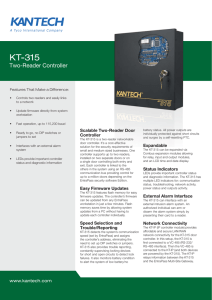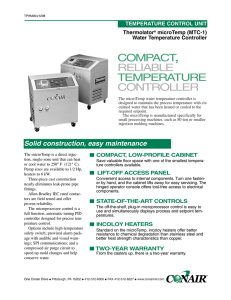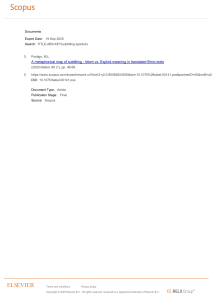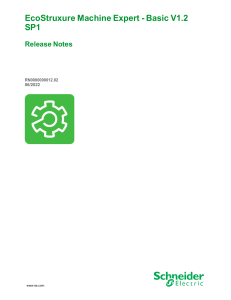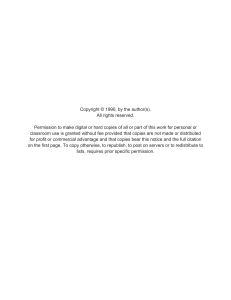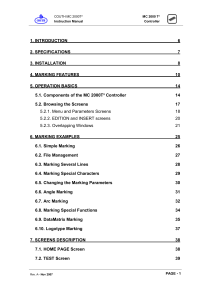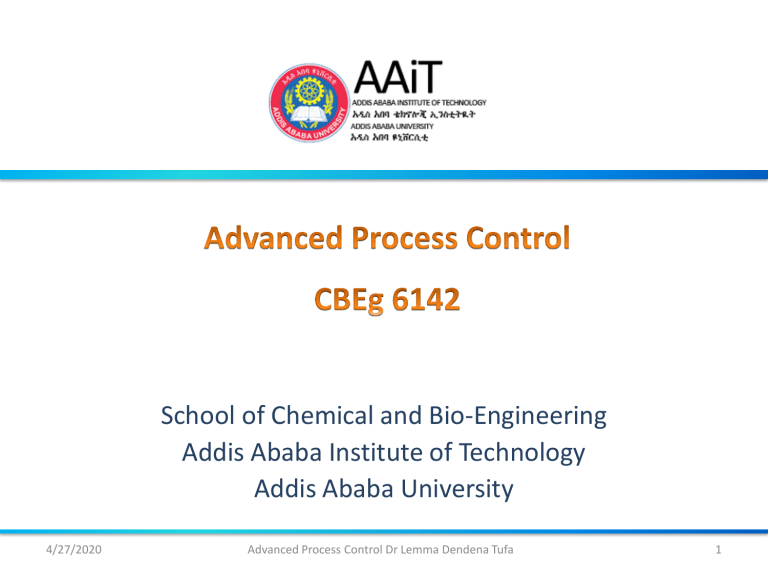
School of Chemical and Bio-Engineering Addis Ababa Institute of Technology Addis Ababa University 4/27/2020 Advanced Process Control Dr Lemma Dendena Tufa 1 4/27/2020 Advanced Process Control Dr Lemma Dendena Tufa 2 Controller Design Classical Approach Given a system (e.g. reactor) Specify controller (e.g.PI or PID) Tune controller (e.g. ZeiglerNichols) Choose alternative controller Choose alternative Tuning Method Conduct performance test Is performance acceptable? END 4/27/2020 Advanced Process Control Dr Lemma Dendena Tufa 3 Direct Synthesis Controller Given a system (e.g. reactor) Specify desired response Design controller END 4/27/2020 Advanced Process Control Dr Lemma Dendena Tufa 4 Direct Synthesis Controller The feedback control loop for servo problem The closed-loop equation for servo problem is given by 𝐺𝑐 𝐺 𝑌= 𝑌𝑠𝑝 1 + 𝐺𝑐 𝐺 4/27/2020 Advanced Process Control Dr Lemma Dendena Tufa (6.1) 5 Direct Synthesis Controller Assuming a desired response for y(s) to be: 𝑌 = 𝑄𝑑 𝑌𝑠𝑝 (6.2) Using (6.2) in (6.1) 𝐺𝑐 𝐺 𝑄𝑑 = 1 + 𝐺𝑐 𝐺 (6.3) Rearranging (6.3) we get the design equation 1 𝑄𝑑 𝐺𝑐 = 𝐺 1 − 𝑄𝑑 4/27/2020 Advanced Process Control Dr Lemma Dendena Tufa (6.4) 6 Direct Synthesis Controller Example 6.1 The transfer function of a process is given below. The desired closed loop response should have a time constant of 5min and no offset is tolerated. Design a controller using the direct synthesis approach. 0.25 𝐺= 8𝑠 + 1 1 𝑄𝑑 = 5𝑠 + 1 4/27/2020 No offset Time constant Advanced Process Control Dr Lemma Dendena Tufa 7 Direct Synthesis Controller Solution 8𝑠 + 1 1/(5𝑠 + 1) 𝐺𝑐 = 0.25 1 − 1/(5𝑠 + 1) 8𝑠 + 1 1 = 0.25 (5𝑠 + 1) − 1 8𝑠 + 1 =4 5𝑠 1 = 6.4 1 + 8𝑠 This a PI controller with Kc=6.4 and I= 8 min 4/27/2020 Advanced Process Control Dr Lemma Dendena Tufa 8 Direct Synthesis Controller Example 6.2 The transfer function of a process is given below. The desired closed loop response should have a transfer function given by Qd. Design a controller using the direct synthesis approach. Use 1st order Taylor series expansion for the time delay. 0.2𝑒 −1.2𝑠 𝐺= 3.6𝑠 + 1 𝑒 −1.2𝑠 𝑄𝑑 = 𝑠+1 4/27/2020 Advanced Process Control Dr Lemma Dendena Tufa 9 Direct Synthesis Controller Solution (3.6𝑠 + 1) 𝑒 −1.2𝑠 /(𝑠 + 1) 𝐺𝑐 = 0.2 1 − 𝑒 −1.2𝑠 /(𝑠 + 1) (3.2𝑠 + 1) 1 = 0.2 𝑠 + 1 − 𝑒 −1.2𝑠 (3.2𝑠 + 1) 1 = 0.2 𝑠 + 1 − (1 − 1.2𝑠) (3.2𝑠 + 1) 3.2 1 1 𝐺𝑐 = = 1+ = 7.27 1 + 0.44𝑠 0.44 3.2𝑠 3.2𝑠 This a PI controller with Kc= 7.27 and I= 3.2 min 4/27/2020 Advanced Process Control Dr Lemma Dendena Tufa 10 Direct Synthesis Controller Example 6.3 For process that are estimated by first order plus time delay (FOPTD) and second order plus time delay (SOPTD) models given below. Design controllers using the direct synthesis approach. Use 1st order Taylor series expansion for the time delay. 𝐾𝑒 −𝜃𝑠 𝐺= 𝜏𝑠 + 1 𝐾𝑒 −𝜃𝑠 𝐺= (𝜏1 𝑠 + 1)(𝜏2 𝑠 + 1) 4/27/2020 Advanced Process Control Dr Lemma Dendena Tufa 11 Direct Synthesis Controller Solution 1𝑒 −𝜃𝑠 𝑄𝑑 = 𝜏𝑐 𝑠 + 1 𝐾𝑒 −𝜃𝑠 𝐺= 𝜏𝑠 + 1 1𝑒 −𝜃𝑠 𝜏𝑠 + 1 𝜏𝑐 𝑠 + 1 𝜏𝑠 + 1 1 𝐺𝑐 = = 𝐾 𝜏𝑐 𝑠 + 1 − 𝑒 −𝜃𝑠 𝐾𝑒 −𝜃𝑠 1𝑒 −𝜃𝑠 1− 𝜏𝑐 𝑠 + 1 Using first order Taylor’s expansion 𝑒 −𝜃𝑠 = 1 − 𝜃𝑠 𝜏𝑠 + 1 𝜏 𝐺𝑐 = = 𝐾 𝜏𝑐 + 𝜃 𝑠 𝐾 𝜏𝑐 + 𝜃 1 1+ 𝜏𝑠 This is a PI controller with 𝐾𝑐 = 𝜏 𝐾(𝜏𝑐 +𝜃) 4/27/2020 and 𝜏𝐼 = 𝜏 Advanced Process Control Dr Lemma Dendena Tufa 12 Direct Synthesis Controller Solution 1𝑒 −𝜃𝑠 𝑄𝑑 = 𝜏𝑐 𝑠 + 1 𝐾𝑒 −𝜃𝑠 𝐺= (𝜏1 𝑠 + 1)(𝜏2 𝑠 + 1) Inserting and simplifying 𝜏1 𝜏2 𝑠 2 + (𝜏1 +𝜏2 )𝑠 + 1 𝜏1 + 𝜏2 1 𝜏1 𝜏2 𝐺𝑐 = = + + 𝑠 𝐾(𝜏𝑐 +𝜃)𝑠 𝐾(𝜏𝑐 +𝜃) 𝐾(𝜏𝑐 +𝜃)𝑠 𝐾(𝜏𝑐 +𝜃) 𝜏1 + 𝜏2 1 𝜏1 𝜏2 𝐺𝑐 = 1+ + 𝑠 𝐾(𝜏𝑐 +𝜃) 𝜏1 + 𝜏2 𝑠 𝜏1 + 𝜏2 This is a PID controller with 𝐾𝑐 = 4/27/2020 𝜏1 +𝜏2 𝐾(𝜏𝑐 +𝜃) 𝜏𝐼 = 𝜏1 + 𝜏2 𝑎𝑛𝑑 𝜏𝐷 = Advanced Process Control Dr Lemma Dendena Tufa 𝜏1 𝜏2 𝜏1 +𝜏2 13 Direct Synthesis Controller Exercise 6.1 The transfer function of three processes are given below. The desired closed loop response should have no-offset . Fore each of the three processes design a controller using the direct synthesis approach. Determine, the time desired time constant by yourself. Use Skogestad’s half rule whenever necessary. 𝐺= 3.5 −0.5𝑠+1 𝑒 −0.8𝑠 (4.2𝑠+1)(3.2𝑠+1) 𝐺= 0.5𝑒 −1.4𝑠 (4.2𝑠+1)(1.7𝑠+1)(0.8𝑠+1) iii. 𝐺 = 0.5(−0.8𝑠+1)𝑒 −1.4𝑠 (4.2𝑠+1)(1.7𝑠+1)(0.8𝑠+1) i. ii. 4/27/2020 Advanced Process Control Dr Lemma Dendena Tufa 14
